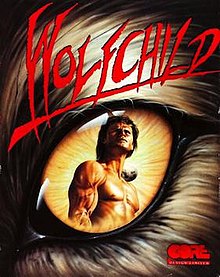
Zool: Ninja of the Nth Dimension is a platform game written for the Amiga by Gremlin Graphics and published in 1992. It was marketed as a rival to Sega's Sonic the Hedgehog. Zool was ported to other platforms and followed by Zool 2 in 1993.
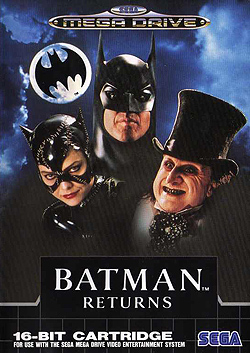
Batman Returns is the name of several video games for various platforms based on the 1992 film of the same name.
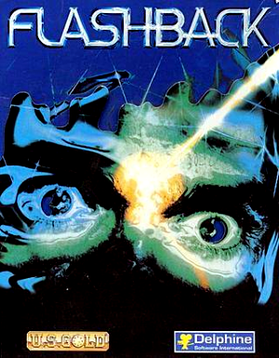
Flashback, released as Flashback: The Quest for Identity in the United States, is a 1992 science fiction cinematic platform game developed by Delphine Software of France and published by U.S. Gold in the United States and Europe, and Sunsoft in Japan.
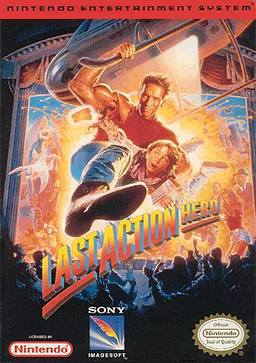
Last Action Hero is a series of action video games based on the 1993 film of the same name. Versions were released for the NES, Super NES, Sega Genesis, Game Boy, Game Gear, and MS-DOS. Versions were also planned for the Sega CD and Master System, but ultimately were not released.

Chuck Rock is a 1991 slapstick side-scrolling platform video game developed and published by Core Design for the Atari ST and Amiga computers. A Commodore 64 port followed in 1992 and an Amiga CD32 version in 1994. The game was subsequently published by Krisalis Software for the Acorn Archimedes. Virgin Interactive published the game for the Sega Mega Drive/Genesis, Master System, and the Game Gear. Sony Imagesoft published the game for the Sega Mega-CD, Super NES, and Game Boy.
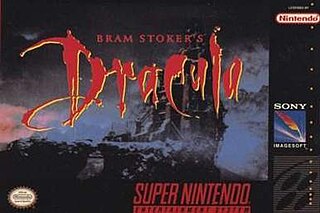
Bram Stoker's Dracula is a 1993 video game released for the Mega Drive/Genesis, Nintendo Entertainment System, Super NES, Game Boy, Master System, Sega CD, Game Gear, MS-DOS and Amiga games consoles. Based on the 1992 movie of the same name which in turn is based on the 1897 novel by Bram Stoker, each version of the game was an action-platformer except the Sega CD and Amiga versions which were beat 'em ups, and the DOS version which was a first-person shooter. The Amiga version was released in 1994 for North America and Europe. A CD-ROM version for DOS was released in 1995.
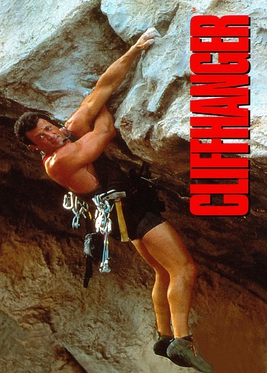
Cliffhanger is a beat 'em up, platform game that was released on October 17, 1993 based on the film of the same name.

Jungle Strike is a video game developed and published by Electronic Arts in 1993 for the Sega Genesis/Mega Drive. The game was later released on several other consoles such as the Super Nintendo Entertainment System (SNES), and an upgraded version was made for DOS computers. The Amiga conversion was the responsibility of Ocean Software while the SNES and PC DOS versions were that of Gremlin Interactive, and the portable console versions were of Black Pearl Software. It is the direct sequel to Desert Strike and is the second installment in the Strike series. The game is a helicopter-based shoot 'em up, mixing action and strategy. The plot concerns two villains intent on destroying Washington, D.C. The player must use the helicopter and occasionally other vehicles to thwart their plans.
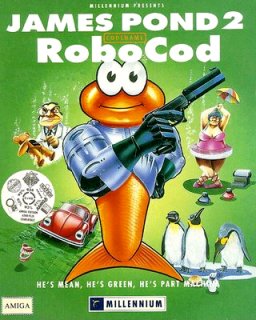
James Pond 2: Codename: RoboCod, also known as Super James Pond on SNES in North America, and Game Boy, and Super James Pond 2 in Europe, is a 1991 platform video game. It was developed by the same British teams as the original. The title music by Richard Joseph is a marimba-heavy rendition of the RoboCop film theme. It is the second installment in the James Pond series.

PGA Tour Golf is a golf video game and the first in the PGA Tour game series. It was developed by Sterling Silver Software and released in 1990, for MS-DOS. It was initially published by Electronic Arts, which subsequently released versions of the game for Sega Genesis and Amiga in 1991, followed by a version for the SNES in 1992. By 1994, Tengen had published versions for Sega's Master System and Game Gear consoles. PGA Tour Golf received generally positive reviews for its realism, sound, and camera. Several critics considered the computer versions to be the best golf game available at the time of its release. It was followed by PGA Tour Golf II.

There have been several video games based on the 1991 film Hook. A side-scrolling platform game for the Nintendo Entertainment System (NES) and Game Boy was released in the United States in February 1992. Subsequent side-scrolling platform games were released for the Commodore 64 and the Super Nintendo Entertainment System (SNES), and an arcade beat ‘em up by Irem later in 1992, followed by versions for the Sega CD, Sega Genesis, and Sega's handheld Game Gear console in 1993.

The Lion King is a platform game based on Disney's 1994 animated film The Lion King. The game was developed by Westwood Studios and published by Virgin Interactive Entertainment for the Super NES and Genesis in 1994, and was ported to MS-DOS, Amiga, Game Gear, Master System, and Nintendo Entertainment System. The Amiga, Master System, and NES versions were only released in the PAL region. It is the final licensed NES game worldwide. The game follows Simba's journey from a young cub to the battle with his uncle Scar as an adult.

Bubba 'n' Stix is a side-scrolling platform game for the Sega Genesis, Amiga and CD32 developed and released by Core Design. The Genesis version was released by Tengen in the United States and featured a promotional tie-in with the Bubblicious bubble gum brand.

Sink or Swim is a puzzle video game that was released in 1993 for MS-DOS Developed by Zeppelin Games. It is similar in style to Lemmings. The game was ported to the Amiga and the Super Nintendo Entertainment System. Sega Genesis and Game Gear versions were renamed to S.S. Lucifer: Man Overboard!.

Brutal: Paws of Fury is a 2D fighting game published by GameTek in 1994. The game features a cast of various anthropomorphic animals as selectable fighters. It also features the ability to learn new attacks and save them via passwords. Originally a Sega CD exclusive, it was later ported to other game consoles.

Arcus Odyssey is an action game video game developed by Wolf Team and released by Renovation Products in 1991 for the Sega Mega Drive/Genesis and X68000 and in 1993 for the Super Nintendo Entertainment System. The game features an isometric perspective and cooperative gameplay, as well hack and slash gameplay. It tells the story of four heroes trying to thwart the return of an evil sorceress.

Mighty Morphin Power Rangers is the title of five different video games based on the first season of the television series of the same name, one for each of the following game platforms: Sega Genesis/Mega Drive, Super Nintendo Entertainment System, Game Boy, Game Gear, and Sega CD. The Nintendo versions of the game were released by Bandai, while the Sega versions were published by Banpresto, a pseudonym of Bandai. The Green Ranger is only playable on the Genesis and Game Gear versions of the game.
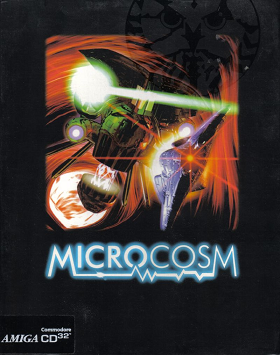
Microcosm is a 3D rail shooter video game developed and published by Psygnosis in 1993. It was originally developed for the FM Towns, and also ported for the Sega Mega-CD, Amiga CD32, 3DO, and MS-DOS. Microcosm featured realistic FMV animation, with the graphics being rendered on Silicon Graphics workstations. The game is either in first-person or third-person view depending on the gaming system.
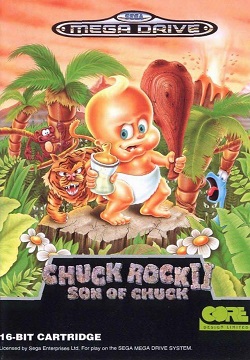
Chuck Rock II: Son of Chuck is a slapstick side-scrolling platform video game developed by Core Design and published by Virgin Interactive Entertainment in 1993 for the Amiga, CD32, Game Gear, Sega CD, Master System, and Mega Drive/Genesis.

Samurai Shodown, known in Japan as Samurai Spirits, is a fighting game developed and published by SNK for the Neo Geo arcade and home platform. Released in 1993, it is the first installment in the Samurai Shodown series. In contrast to other fighting games at the time, which were set in modern times and focused primarily on hand-to-hand combat, Samurai Shodown is set in feudal-era Japan and was SNK's first arcade fighting game to focus primarily on weapon-based combat.
